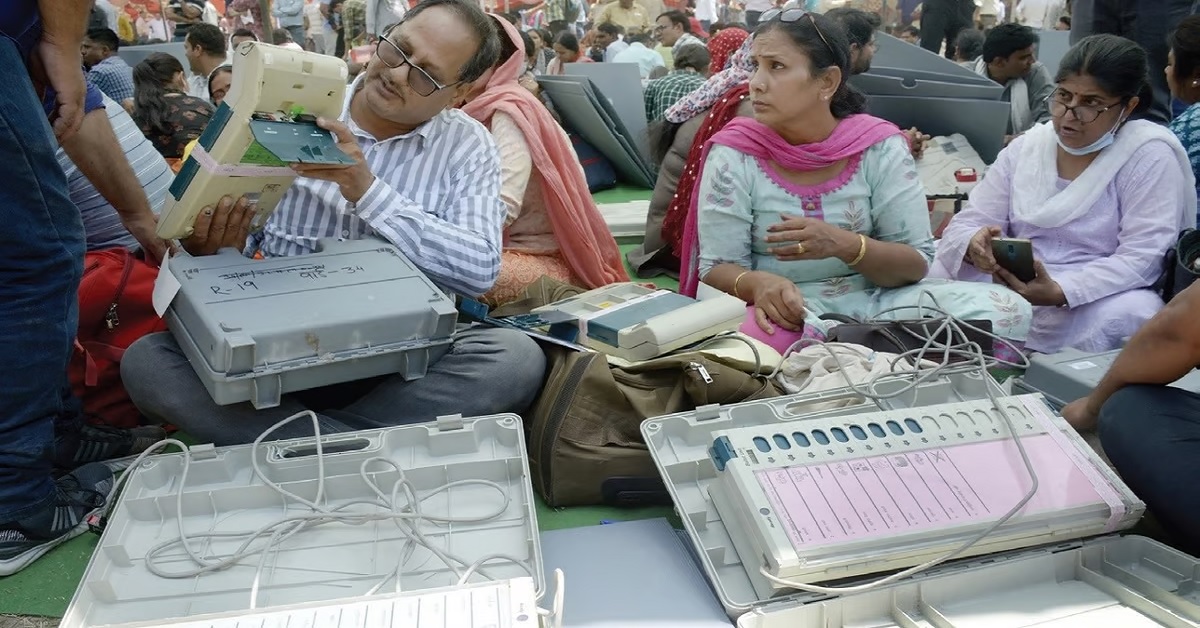Concerns over the transparency of the overall election process—doubtful and sudden increase in voters, surge in percentage, illegal deletion of voters from the lists and then the accuracy of the electronic voting machines (EVMs) and voter-verifiable paper audit trail (VVPAT) machines have prompted 104 opposition candidates in the recent Maharashtra assembly elections to file applications with the Election Commission, seeking verification of the machines used.
These candidates, including several prominent political figures, have raised doubts about the overall counting process and sought assurance regarding the proper functioning of the electoral system. Reportedly, the Election Commission has received verification requests from 95 assembly constituencies spread across 31 districts in Maharashtra. Among the applicants are well-known leaders such as Rajan Vichare, Balasaheb Thorat, Rajesh Tope and Kshitij Thakur from Nalasopara. Other prominent candidates who have submitted their applications include Kedar Dighe who contested against Ekanth Shinde from Kopari Pachpakhadi, Yugendra Pawar who fought against his uncle Ajit Pawar from Baramati, Rohini Khadse daughter of NCP leader Eknath Khadse from Muktainagar, former minister Rajesh Tope from Ghansawangi, Hitendra Thakur from Vasai.
According to the judgement of the Supreme Court (in the midst of conduct of the 2024 Lok Sabha polls), dated 26, 2024, a specific modality was set for how the Microcontroller SLU Verification would/must take place. In what appears to be a violation of this directive, Returning Officers (RO) are telling candidates in Maharashtra that only a “mock poll” would be carried out.
Vote for Democracy (VFD) a citizens platforms, asked one of its experts Professor Harish Karnick formerly an alumni with IIT Kanpur to respond to what appears to be one more questionable abdication by the Election Commission of India.
This video below explains the entire controversy.
Details of Verifications sought
Notably, Thane district recorded the highest number of verification requests, with 12 applications filed. Pune followed close behind, with 11 requests. A total of 137 EVMs have been sought for inspection. In contrast, five districts — Sindhudurg, Amravati, Wardha, Nandurbar and Gadchiroli — have so far reportedly not report any applications for machine verification.
The Maharashtra assembly elections saw a surprise significant victory for the BJP-led Mahayuti, comprising Eknath Shinde’s Shiv Sena and Ajit Pawar’s NCP faction. The BJP emerged as the single largest party, securing 132 seats out of the 149 contested, while the Shiv Sena and the NCP won 57 and 41 seats, respectively. Together, the ‘grand alliance’ amassed 237 seats, a resounding majority in the 288-member assembly.
The Thackeray-led Shiv Sena (UBT) has emerged as the largest opposition party in the Maharashtra assembly, securing 20 seats. The Congress followed with 16 wins, while the NCP (SP) faction led by Sharad Pawar ended with 10 seats. From the first day itself however, allegations of discrepancies in the counting process have sparked fresh debates over the reliability of EVMs and VVPAT systems.
Said one candidate to the media, “I have been in discussions with Uddhav Thackeray, who mentioned receiving complaints from party workers alleging possible tampering with EVMs. Similar complaints are coming from across the state, and many candidates, including myself, are applying for machine verification,” he said.
Citing the Supreme Court’s April 26, 2024 ruling, Khan emphasised the mandatory verification of 5 per cent of EVM systems — comprising the control unit, the ballot unit and VVPAT — for each constituency. This verification involves testing for tampering or modifications by a team of engineers from the EVM manufacturers.
According to the guidelines, defeated candidates positioned second or third in their constituencies can file a request for verification within seven days of the results. The verification process incurs a fee of Rs 41,000, refundable only if tampering is detected. The microcontroller chip in the EVMs is a one-time programmable component embedded during manufacturing, which ensures it cannot be reprogrammed after deployment.
A Sena (UBT) MLA from Mumbai alleged mismatches between the number of votes cast and counted in specific constituencies, raising doubts over the electoral process. “Almost all opposition candidates have expressed concerns about the functioning of EVMs,” the MLA said.
As opposition leaders push for transparency, these allegations bring renewed attention to the integrity of India’s voting system. While the Election Commission claims to have implemented measures to address such concerns, the widespread doubts raised post-election highlight the need for robust safeguards to maintain public confidence in democratic processes.
Related:
Markadwadi, Pune, Sholapur, Akola, are protests against ECI mounting in Maharashtra?
Congress raises alarm over manipulated voter rolls in Maharashtra Assembly elections
Recounting ordered in Nashik West assembly election amid EVM tampering allegations

